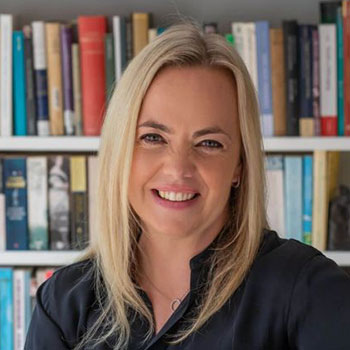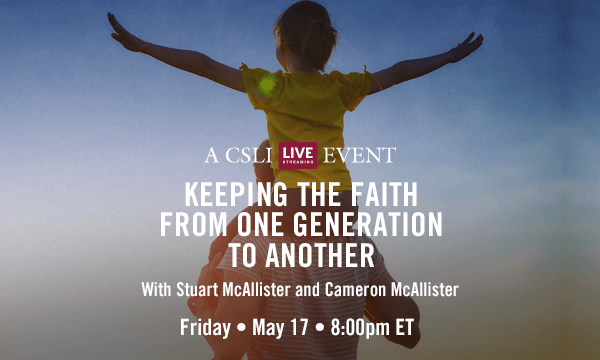Back to series


Open in prayer — that through this study God would guide your discussion and equip you to become more effective in defending and sharing your faith in Jesus Christ.
Why Trust the Bible? Amy Orr-Ewing (32 min.)
Discuss the topic “Why Trust the Bible?” using these starter discussion questions:
1. What are some common perceptions or statements about the Bible that you have heard from non-Christians?
2. What did you grow up believing about the Bible’s reliability and authority?
3. What insights did you gain from Amy’s talk on the reliability of the Bible?
4. What did you learn from Patty’s article on some of the reasons we can argue for the reliability of the Bible?
5. What relevance does this topic have for your personal faith? Evangelism?
Read the conversational apologetics exercise given as homework in Session 2. Break up into small groups to complete the exercise.
Determine practical steps to take this week to apply what you’ve discussed. Take time to write them down. If you have a question or doubts regarding the authority of Scripture, make a point of researching that question more and report back to the group what you’ve discovered.
Pray for one another and your non-Christian friends.
Introduce the assignments for the next session and close in prayer.
Assignments to Complete before Session 4: How Can God Allow Suffering?
Memorize and meditate upon Psalm 86:15 (NIV):
But you, Lord, are a compassionate and gracious God, slow to anger, abounding in love and faithfulness.
Read the article “Lessons on Grace in a Valley of Grief,” by Kristie Jackson. Read as a PDF (This article is also included below.)
Read the article “C.S. Lewis on the Problem of Pain,” by Jana Harmon. Read as a PDF (This article is also included below.)
Read and reflect upon the following conversational apologetics practice exercise, to be discussed in Session 4.
Conversational apologetics exercise: The problem of evil and suffering is perhaps the most difficult question we will ever have to address in our lives. With this in mind, brainstorm some ways to respond to the following situations:
1. In conversation following the news of a suicide bombing in which many have been killed and injured, a colleague states, “I can’t believe in a God who would allow these kind of horrific kinds of suffering to occur.” How would you respond?
2. Your friend has just lost a close relative after a long bout with cancer. How can you respond to the suffering and loss that your friend is feeling?
3. A child asks, “Why do bad things happen?” How would you answer?
Lessons on Grace in a Valley of Grief
by Kristie Jackson
C.S. Lewis Institute Fellow
Living a life of contentment depends in part upon one’s expectations, and there’s a disturbing trend among Christians to embrace expectations that are anything but biblical. Set foot in a Christian bookstore, and you’ll see lots of titles about living a life of total enjoyment, staying young, and keeping healthy. One might even believe that with the proper advice from the right guru, you could lead a life free from trouble. But the Bible says nothing of an idyllic or carefree life this side of heaven. In fact, Jesus couldn’t be any clearer in John 16:33 when he tells the disciples, “In this world you will have trouble” (NIV).
Yet we are masters at ignoring this simple truth. We continue to chase that rainbow of a life that was never intended for this world, and we’re keenly disappointed when we run into heartache instead of a pot of gold. And wasn’t this precisely the game plan of the demons in The Screwtape Letters? Screwtape explained to Wormwood, “We want a whole race perpetually in pursuit of the rainbow’s end.”1

I ran into heartache several years ago. Before 1999, I had never really experienced true sorrow. I was happily married, and I enjoyed the added blessing of my husband, Will, a physician, blending into my family to an unusual degree. During our years of dating, my brother, Craig, and Will became the very best of friends. They loved spending time together, and kept each other laughing for hours on end. My dad and Will also shared an uncommon fondness and admiration for each other. Since God had blessed them both with incredible intellect, they enjoyed each other’s insights, and they spent whole afternoons in deep conversation. Sometimes I even felt as though Will was more a part of my family than I was. We had many wonderful times together, and I cherish all those memories.
But that season of life changed abruptly in the fall of 1999. One Saturday afternoon in November my parents boarded a plane in Florida to come see Will and me in Washington, D.C. Because they were using pass privileges from my sister’s job with Northwest, they were making a connection in Detroit, which is where I grew up. About five minutes before I needed to leave for the airport, the phone rang.
My brother Craig had the unbearable job of telling me that our beloved father had had a heart attack on the airplane, and that he had died before they landed in Detroit. I remember hanging up the receiver, and just screaming and screaming and screaming. Will was on call at the hospital and we had just moved into the neighborhood the week before. Someone called the police in response to all the screaming and it was a surreal experience when they showed up at my door.
When I paged Will, he rushed home from the hospital and did his best to console me. He held me and read Scripture to me, but after many hours had passed, I still could not sleep. I went and sat on the bed where my parents were supposed to be. I was overwhelmed by how quickly my life had changed. And the only thing I could pray was, “God help her,” because I didn’t know how my mom could possibly survive the loss. In fact, I was worried from that very first night that it would be like losing both of my parents.
Will and I took the first flight to Michigan the next morning, but standing at the curb in Detroit, I almost expected my dad to pick us up, apologizing for all the confusion. It’s amazing how long it takes for reality to set in. Even after the funeral I could hardly grasp that my dad was truly gone. I wore the “invisible blanket” that C.S. Lewis talked about—no matter where I was or what I was doing, I felt isolated and separate. I felt there was an omnipresent fog around me, and something in me desperately wanted others to acknowledge it.
By God’s grace and in spite of the fog, I graduated from law school six months later. I have never shed as many tears as I did that day. That my daddy wasn’t there was enough, but my heartache was intensified by the fact that he had taken the highly unusual step of ordering my graduation gift the summer before. As I opened a rare and beautifully ornate copy of the United States Constitution, I thought I would die of grief. And it was in the weeks that followed, as I was studying for the bar exam, that I lived those first words of A Grief Observed, which so aptly state, “No one ever told me that grief felt so like fear.” I started having panic attacks. I was afraid, although I didn’t know what I was afraid of. I was emotionally and physically exhausted and yet I could not sleep. It was the undeniable hand of God that helped me pass the bar, and what a gift it was to have six weeks to rest before I had to start my new job.

Of course my mom was devastated by my father’s sudden and unexpected death, but my fear of losing her in a sea of grief never materialized. Both of my brothers and my sister devoted lots of time to caring for her, and I bought a cell phone and talked to her during my commute every day. I was so proud of my mom because she clung to God’s promises and her faith never wavered. As a family we coped fairly well. Sorrow brought us closer and we talked more often about our faith and things eternal. Life seemed to be returning to normal.
But two years later, in January 2002, I got another phone call from Craig. This time he was calling about my mom’s brother, whom we all adored and lovingly called Uncle Butch. Uncle Butch had doted on all his nieces and nephews, teasing us unmercifully and loving us unconditionally. In his early fifties he had started to exhibit dramatic mood swings, and was diagnosed with bipolar disorder. Uncle Butch had visited Will and me in Washington in 2000 in the midst of a mild episode of mania. I remember him talking sixty miles an hour, and telling me all sorts of hilarious stories. It was a bit like being around someone very gregarious, but it was over the top. You just knew something wasn’t right. I remember answering the phone in the kitchen that evening when Craig told me that Uncle Butch had taken his own life. Again we traveled to Michigan for the funeral. But this funeral was different because even though mental illness is like any other illness in some respects, for those left behind after a suicide there is an element of grappling with feelings that their loved one chose to leave them.
In July that same year, my mom was visiting us, spending time bonding with our firstborn, when she got a call on her cell phone. I vividly remember hearing her cry out, and I remember running down the steps to see what was the matter. My sweet and wonderful brother, Craig, had been in a small airplane that went down that morning in the Atlantic Ocean. Although the Coast Guard had reported that there were no survivors, I tried to rationalize that Craig was a strong swimmer, that there might have been some mistake, that there had to be some mistake. I could not lose him too, and my mom couldn’t lose him either. This would be too much.
I think probably all big brothers play the role of protector for their little sisters, but Craig, being seven years older than me, took this position very seriously. When as a child I was scared of storms or nightmares I didn’t run to my parent’s room. I think they would have sleepily told me I was being silly, but Craig was a fount of sympathy and never ran out of patience. And that was the story of our entire relationship. I always could, and always did, run to him in the storms of life.
The next morning we flew to Florida, where Craig had lived. We had a memorial service there, and then a few days later we went on to Michigan for the funeral. I remember sitting in a row on the airplane with my mom, Will, and our baby boy, and watching tears stream down Will’s cheeks the entire flight. It was an odd comfort for me to have my husband grieve not just for me, but with me.
A couple of months later, in November 2002, my sister gave birth to a beautiful baby boy, named Brett. When Brett was just a couple of days old, the doctors told my sister and her husband that parts of Brett’s brain were missing and that he could not process what his eyes were capable of seeing. Brett is now six years old and does not walk or talk. His blindness and other disabilities have made achieving even the simplest of baby milestones a challenge, and caring for him is tremendously taxing.
In December of 2004 I got yet another tragic and unexpected phone call. This time it was from my cousin Cassie, who is more like my sister than my cousin. It was Cassie’s dad, Uncle Butch, who had committed suicide just a few years before. I remember Cassie’s shock-induced calm as she told me that her three-month-old baby girl had inexplicably died that day at daycare.
Two days later we were once again traveling to Michigan, seeing the same friends and family. In some respects it was like reliving a terrible nightmare, but the tiny little casket and precious, perfect baby lying inside made this funeral especially heart-wrenching. Although Cassie and her husband, Michael, both seemed resigned to God’s sovereignty despite their aching hearts, it was impossible not to wonder how could taking this little life, ripping this beautiful baby girl away from this loving family be part of God’s plan? How could He use something like this for good? These are hard questions, and I don’t have answers right now, maybe I never will. Will and I are blessed with three sons, and Cassie and Michael now have two daughters, but it often occurs to me, and probably to them, that they should have three.

Over the course of these difficult years, I’ve seen various biblical truths play out in my own life and in the lives of those around me. Specifically, these years have taught me that God never gives us more than we can handle. When I hear people say things like, “I couldn’t take it if such and such happened,” I cringe. 2 Corinthians 12:9 says, “My grace is sufficient for you, for my power is made perfect in weakness” (NIV). I am learning to rest in confidence that whatever comes my way, He will be there to sustain me. It’s very freeing, not just to read this truth in Scripture, but to know it in the depths of my soul.
Another truth I’ve observed is that life is fleeting and the future unknowable. James reminds us that we cannot know what will happen tomorrow; he says, “You are a mist that appears for a little while and then vanishes.” (4:14, NIV). This I know intimately, so intimately, in fact, that unexpected phone calls at odd hours startle me. But the benefit of my experience is that I treasure the gifts I have in the present. My losses have instilled a profound gratitude for the here and now.
I’ve also learned that true love for God is not based on what He can do for us, as some “Christian” bestsellers suggest. Rather, love for God should be a response to who He is and His love for us. And that brings me to the most vital of the lessons that I have learned. Simply put, it is all about believing God and His Word. Regardless of whether you are stuck in the valley or enjoying still waters, every day you face a choice of utmost importance. Are you going to believe God and His promises on this day, in this moment, or are you going to doubt Him? There are really only two options.
As I have sought to trust him in my sufferings, He has been correcting my expectations and centering me in the present so that I do not miss today’s gifts. I am finding that there’s something qualitatively different about lessons learned in times of trouble. While the still, small voice of our Heavenly Father is always there, somehow it is easier for me to discern in the valley of the shadow of death. Beside still waters there are often distractions for me, but in the hour of desperation, when there is nowhere to turn, I have found that God’s grace is indeed sufficient. These times of brokenness have instilled contentment, gratitude, and empathy.
Some may question whether we could learn God’s lessons another way, but I believe Job’s plea for understanding is instructive. God answered him with a series of questions that highlight how little we, in our humanness, truly understand, and then He said, “Will the one who contends with the Almighty correct him?” So even though I do not understand the series of tragedies that have happened in my family, I cannot contend with the Almighty, much less presume to correct Him. Rather, I trust that because God is a good, wise, and loving Father, these hardships were necessary for my ultimate good.2
Through this experience, I desperately want to learn and apply all that God has for me, and I want to continue to reflect on these lessons and share with others God’s faithfulness and love, even in the worst of times. As I do, the words of Isaiah are a great encouragement: “Those who hope in the Lord will renew their strength. They will soar on wings like eagles; they will run and not grow weary, they will walk and not be faint.” (40:31, NIV).
Notes:
1 C.S. Lewis, The Screwtape Letters, Letter xv, para. 4.
2 “The more we believe that God hurts only to heal, the less we can believe that there is any use in begging for tenderness. A cruel man might be bribed — might grow tired of his vile sport — might have a temporary fit of mercy, as alcoholics have fits of sobriety. But suppose that what you are up against is a surgeon whose intentions are wholly good. The kinder and more conscientious he is, the more inexorably he will go on cutting. If he yielded to your entreaties, if he stopped before the operation was complete, all the pain up to that point would have been useless. But is it credible that such extremities of torture should be necessary for us? Well, take your choice. The tortures occur. If they are unnecessary, then there is no God or a bad one. If there is a good God, then these tortures are necessary. For no even moderately good Being could possibly inflict or permit them if they weren’t.” (C.S. Lewis, A Grief Observed, p. 43.)

Kristie Jackson is a freelance writer who has been published in The Washington Post and Indeed magazine. She also writes a weekly devotional on her Website. She and her husband, Will, and their three boys make their home in Falls Church, Virginia.
« INTRO 1 2 3 4 5 6 7 APPENDIX »

C.S. Lewis on the Problem of Pain
by Jana Harmon
Teaching Fellow, C.S. Lewis Institute – Atlanta
The problem of pain is inescapable, its effects profound. No one can deny it. Many use it as a way to remove God from reality. It fuels the flame of doubt and sometimes undermines the believer’s faith. It empowers the atheist’s argument. To be a follower of Christ and to live in the world, one must determinedly, intentionally face the issues and difficulties that lie inherent and obvious in the problem of pain.
C.S. Lewis, a frontline witness to evil in the world, was not immune from personal pain. As a boy, he experienced the death of his mother followed by the emotional abandonment of his father. As a young man, he directly encountered the ugliness of war. As a brilliant Oxford don, he suffered rejection from academic colleagues. As an older man who finally discovered young love, he endured the painful loss of his wife. In 1940, at age forty-two, Lewis penned The Problem of Pain accompanied by a humble, written admission. Fully realizing that he might be underestimating the reality of serious pain, he was compelled to intellectually address the issue, for he understood its profound implications toward belief, or disbelief, in God. After all, Lewis reminds us early on in this writing, it was the problem of evil that foundationally motivated his prior atheism.

The Problem of Pain seeks to understand how a loving, good, and powerful God can possibly coexist with the pain and suffering pervasive in the world and in our lives. Indeed, the problem of pain could not exist without the reality of a good and loving and powerful God. Without a transcendent creator God who ultimately defines good and evil, there are no grounds upon which to substantiate the difference between the two, much less the effect of either. Lewis states that “pain would be no problem unless, side by side with our daily experience of this painful world, we had received what we think a good assurance that ultimate reality is righteous and loving.”1 The innate relationship between the existence of God and pain must be rightly understood if we are honestly to confront the difficult issues that lie therein. Without such an understanding, faith is at risk of crumbling
Theodicy, derived from the Greek words for “deity” and “justice,” “refers to the attempt to justify the goodness of God in the face of the manifold evil present in the world.”2 It begs the question, if God is good and powerful, why does God allow bad things to happen? It speaks to the heart of the issue—the very nature of God, who He is, and who we are in relationship to Him. Lewis asserts “the problem of pain, in its simplest form”: “If God were good, He would wish to make His creatures perfectly happy, and if God were almighty He would be able to do what He wished. But the creatures are not happy. Therefore God lacks either goodness, or power, or both.”3
According to Peter Kreeft4 and basic rhetorical analysis, the veracity of an argument is based upon the soundness of its individual terms, the integrity of each premise or statement, and its overall logic. On its face, this argument against God appears to have power and logic on its side. The terms, premises, and reasoning appear robust and convincing. God is good and powerful. He desires good things for His creatures. But pain and suffering remain, and we are not happy, but miserable.
Confronting this dilemma, Lewis takes issue with our popular understanding of the terms good, loving, and powerful, and what it means to be happy. For it is there, along with our vigorous desire for and understanding of free will, that Lewis makes his case for defeating the apparent contradiction in the problem of pain. Since God is indeed loving, good, and powerful in light of the reality of pain and suffering, it is “abundantly clear” that our conception of those attributes “needs correction.”5 Lewis assures us that proper understanding of the terms bring the co-existence of God with pain and suffering into alignment “without contradiction.”6 He also challenges our discernment of what exactly makes us happy, what satisfies us. When these notions are rightly understood, the argument is emptied of its persuasive power.
As Christians, we believe that God is omnipotent (all-powerful) and that “nothing is impossible” for Him (Luke 1:37). Yet Lewis reminds us that God is constrained by two realities. First, God cannot do what is intrinsically impossible or what Lewis terms “nonsense.”7 The law of noncontradiction — a basic law of logic — applies even to God. God cannot grant free will to humanity and not grant free will at the same time and in the same way. Holding God to a standard of applying two mutually exclusive alternatives is essentially meaningless.
Second, God allows us as human beings to be free agents with free choices. We cannot desire freedom to choose and yet hold God responsible for not preventing our choosing of evil. Either we have freedom or we do not. Either we choose or we do not. We cannot have it both ways. We cannot blame God for our evil actions when we freely chose them. We cannot excuse ourselves and accuse God when freedom was truly granted to us. Our understanding of what it means for God to be all-powerful must be viewed within this informed reality. We must not “think things possible which are really impossible.”8 In other words, we cannot have our cake and eat it too.

This perspective does not, in any way, compromise God’s sovereignty or power. Granting free will to humanity, to love self more than God or to love God more than self, is the ultimate power by which a Creator can grant freedom to His creation. The natural, fixed order of the universe provides a stable framework in which freedom, and the possibility of pain and suffering as well as love, is viable. Lewis soberly reminds us that if the possibility of suffering is excluded, life itself is excluded.9 God, in His omnipotent power, allows us the greatest amount of freedom to choose for or against Him and our fellow man. Pain is a consequence inherent in this sovereign design. Without this freedom, the full extent of goodness, joy, or love cannot be authentically known.
As believers, we also believe in a God who is completely and utterly good; He is all-loving. It is argued that if God was loving and good, there would not be pain in the world, that He would not allow evil to perpetuate and invade our lives. Yet suffering is an inescapable reality. Jesus affirmed this in John 16:33, saying that we would have trouble in this world. In light of this fact, we recognize humanity’s free contribution to suffering. What’s more, as Lewis instructs, we must take another look at our understanding of what it means for God to be good. He insists that God’s idea of goodness is different from ours, vastly better, higher, greater — although not wholly different altogether.
Our popular conception of love and goodness has more to do with kindness, tolerance, and “a desire to see others… happy.”10 We tend to see God’s love as more like a kind, doting grandfather who likes to see his grandchildren contented than as a father who genuinely loves and desires to see the best character developed in the child through discipline. Lewis insists that love in its truest, deepest sense is “more stern and splendid than mere kindness.”11 A loving father will take endless trouble to foster growth in his child, will discipline to make him more lovable rather than leave him to follow his own natural impulses, will be “pleased with little, but demands all”12 God is an intensely interested, loving, all-consuming fire who deeply loves the objects of His love — us. His goodness demands that He make us more lovable. Lewis, again, reminds us:
We were made not primarily that we may love God (though we were made for that too) but that God may love us, that we may become objects in which the Divine love may rest ‘well pleased’. To ask that God’s love should be content with us as we are is to ask that God should cease to be God: because He is what He is, His love must, in the nature of things, be impeded and repelled by certain stains in our present character, and because He already loves us He must labour to make us lovable.13
For God knows that we are most contented when we find that our desire and our love are for Him, not for ourselves. God gives love because He knows we need it. If God chooses to need us, it is because we need to be needed. He loves and needs us for our sake, not His own. “When we want to be something other than the thing God wants us to be, we must be wanting what, in fact, will not make us happy.”14 “Whether we like it or not, God intends to give us what we need, not what we now think we want.”15 His goodness and love are ever altruistic, desiring the good of His creation, of us.
But this begs the question, aren’t I already good, already lovable? Lewis exposes our self-deception. We no longer see ourselves as sinners, but sin’s reality surfaces through our own sense of personal guilt, which we tend to transfer toward corporate responsibility or try to reduce over time. Both strategies are vain attempts to prevent personal culpability. Or we attempt to lower our moral and ethical standards, to reduce them to mere kindness, yet we recognize a higher moral standard exists across time and cultures. This recognition of an ultimate standard in God compels us to either admit our sinfulness and surrender to Him or reject Him. Regardless, we cannot blame our sinfulness and its consequent evils upon God. We are either the perpetrators of sin or the victim of others’ sin against us. Sin, then, becomes the ultimate horror to both God and man.
God created good. Man chose against God, against good, and introduced evil into the world through his rebellion. God did not create evil but knew that the offering of free will in His created beings allowed for the possibility of pain and suffering. Man, as Lewis summarizes, “spoiled himself,” and “good, to us in our present [fallen] state, must therefore mean primarily remedial or corrective good.”16 Subsequently men, not God, have precipitated the vast majority of pain and suffering in the world. Wicked and hurt people hurt one another

The remedy to this pain is self-surrender of the will to God, which in itself can be painful. Dying to one’s own will, day after day, is the constant, ongoing corrective that is required to break our rebellious sinfulness. When we are self-satisfied with our own soul, we will not surrender our will. Sin, according to Lewis, is masked evil. Pain unmasks the evil and exposes the sin for what it is. “Pain insists upon being attended to. God whispers to us in our pleasures, speaks in our conscience, but shouts in our pain: it is His megaphone to rouse a deaf world.”17
We all have some sense of justice. We all want evil to be punished, to be recognized for what it is, especially in others. Yet we deceive ourselves into thinking that all is well with us. Pain reveals the reality of our own evil and gives us a choice to either resist and rebel against the ultimate standard bearer or recognize our sin, repent, and surrender to Him. “Pain shatters the illusion that all is well . . . that what we have, whether good or bad in itself, is our own and enough for us.”18 Pain takes away our false sense of happiness, draws our attention to God and our need for Him. Even in “good, decent people,” the illusion of self-sufficiency must be shattered. And, like a good and loving Father, God is willing to accept whatever surrender and sacrifice we have to offer. Our desires must be changed from pleasing self to pleasing God, which in the end produces our greatest happiness. We must lose ourselves to find ourselves, truly satisfied, in God.
Lewis does not dismiss the fact that pain is pain and it hurts. But he reminds us that the supreme act of self-surrender was found in the person and work of Jesus Christ. Christ knows pain and suffering, intimately, personally, profoundly. His loving sacrifice was for the redemption of us, the sinners whom He loves. His followers are similarly called to lives of submission, to “walk as Jesus did” (1 John 2:6 NIV). Pain reminds us of our humility and utter dependence upon God, upon our true source of goodness, strength, and happiness in Christ. When pain is withdrawn, we tend to forget God and return toward self-sufficiency and sin. Pain does its work on those whose hearts are willing to receive, to grow, to love in greater and more godly ways — to surrender self to God.
Pain, then, in and of itself is not completely bad or evil. It can come from the hand of a good, loving, and powerful God who desires the best for His creation, who genuinely allows for us to be free agents who make free choices. The possibility and reality of pain and suffering is palpable and at times devastating to both victim and perpetrator. Regardless, pain can and does serve redemptive purposes in the lives of those who turn toward God. In light of this, our constant prayer to our loving, good, and powerful Father in heaven should be that of the psalmist: “Deal with your servant according to your love” (Ps. 119:124 NIV).
Yes, God is completely good.
Yes, God is completely powerful.
Yes, pain and suffering exists.
The existence of pain does not negate the presence of an omnipotent, loving God. When understood in the fullness of its context, we realize that it is the very presence of God that provides meaning and hope amid the pain. Christ was the ultimate, innocent bearer of unjust suffering. In the face of abject pain, self-sacrificial love, goodness, and power are met on the cross.
« INTRO 1 2 3 4 5 6 7 APPENDIX »
 Notes:
Notes:
1 C.S. Lewis, The Problem of Pain (1940; repr., SanFrancisco: HarperSanFrancisco, 2001), 14.
2 Van A. Harvey, A Handbook of Theological Terms (New York: Macmillan, 1964), 236.
3 Lewis, Problem of Pain, 16.
4 Peter Kreeft, lecture on The Problem of Pain, https://www.peterkreeft.com/audio.htm.
5 Lewis, Problem of Pain, 32.
6 Ibid., 27.
7 Ibid., 18.
8 Ibid., 19.
9 Ibid., 25.
10 Ibid., 31.
11 Ibid., 32.
12 Ibid., 39.
13 Ibid., 40-41.
14 Ibid., 46.
15 Ibid., 46-47.
16 Ibid., 85.
17 Ibid., 91.
18 Ibid., 94.

Jana Harmon is a Christian apologist who is a Teaching Fellow for C.S. Lewis Institute–Atlanta. Jana is completing her doctoral work at the University of Birmingham in England, researching the dynamics involved when atheists come to faith in Christ. She has an M.A. in apologetics from Biola University. She has contributed to a number of scholarly journals and speaks around the country in churches, university campuses, and other venues.

Amy Orr-Ewing
Speaker Amy Orr-Ewing is an international author, speaker, and theologian. She presently serves as the Director of Programs for the Oxford Centre for Christian Apologetics (OCCA). She has written two books exploring key questions in apologetics: Why Trust the Bible? and But Is It Real? She has coauthored several books with her husband Frog, including Millennials: Reaching and Releasing the Rising Generation and Holy Warriors: A Fresh Look at the Face of Extreme Islam. Amy has also contributed to publications such as God and the Generations and Worth Knowing: Wisdom for Women. She has been invited to speak in the White House, Capitol Hill, and the UK Parliament. Amy holds a Ph.D. in Theology from the University of Oxford. COPYRIGHT: This publication is published by C.S. Lewis Institute; 8001 Braddock Road, Suite 301; Springfield, VA 22151. Portions of the publication may be reproduced for noncommercial, local church or ministry use without prior permission. Electronic copies of the PDF files may be duplicated and transmitted via e-mail for personal and church use. Articles may not be modified without prior written permission of the Institute. For questions, contact the Institute: 703.914.5602 or email us.
COPYRIGHT: This publication is published by C.S. Lewis Institute; 8001 Braddock Road, Suite 301; Springfield, VA 22151. Portions of the publication may be reproduced for noncommercial, local church or ministry use without prior permission. Electronic copies of the PDF files may be duplicated and transmitted via e-mail for personal and church use. Articles may not be modified without prior written permission of the Institute. For questions, contact the Institute: 703.914.5602 or email us.
-
Recent Podcasts
The Side B Stories – Adam Terry’s Story
by Adam Terry, Jana Harmon on April 26, 2024Adam Terry experienced an intellectual crisis of faith....Read More
-
A Welcome Change in Apologetics
by Randy Newman, Aimee Riegert on April 19, 2024
-
Questions That Matter Podcast – Samuel James and Digital Liturgies
by Samuel James, Randy Newman on April 19, 2024
-
Recent Publications
Isn’t Morality Relative?
by Christopher L. Reese on April 1, 2024It is widely accepted in the Western world...Read More
-
Do Muslims and Christians Worship the Same God?
by Andy Bannister on March 1, 2024
-
Artificial Intelligence and Its Impacts on Humanity
by John Lennox on February 13, 2024
0
All Booked
0.00
All Booked
0.00
All Booked
22140
GLOBAL EVENT: Keeping the Faith From One Generation To Another with Stuart McAllister and Cameron McAllister, 8:00PM ET
https://www.cslewisinstitute.org/?event=global-event-keeping-the-faith-from-one-generation-to-another-with-stuart-mcallister-and-cameron-mcallister-800pm-et&event_date=2024-05-17®=1
https://www.paypal.com/cgi-bin/webscr
2024-05-17

Next coming event
Days
Hours
Minutes
Seconds
GLOBAL EVENT: Keeping the Faith From One Generation To Another with Stuart McAllister and Cameron McAllister, 8:00PM ET
On May 17, 2024 at 8:00 pmCategories
Speakers

Amy Orr-Ewing
Speaker
Team Members





